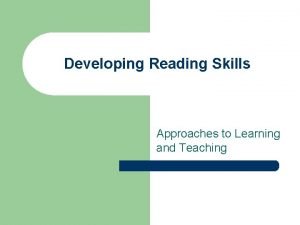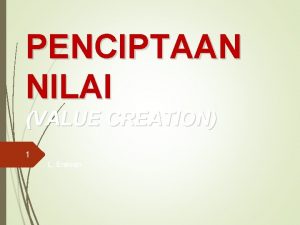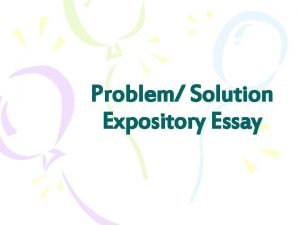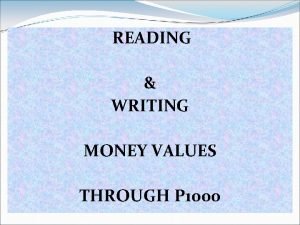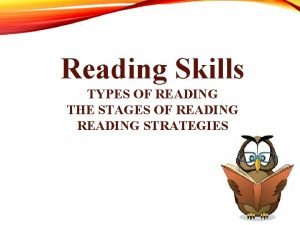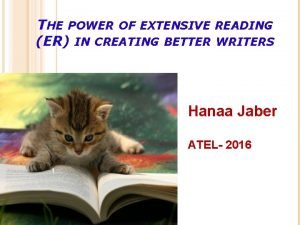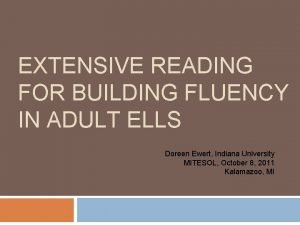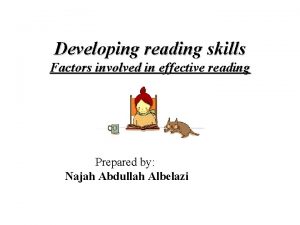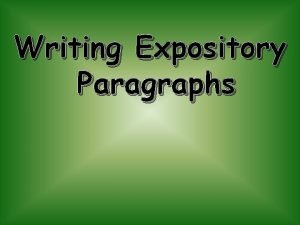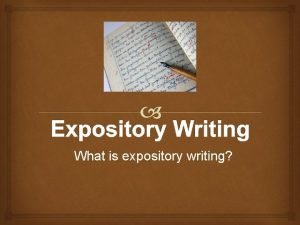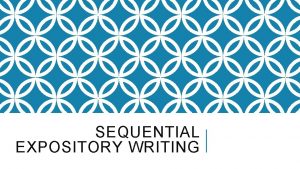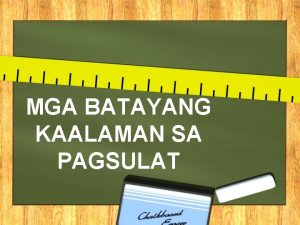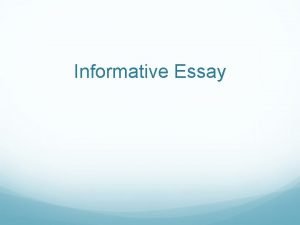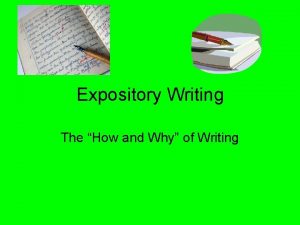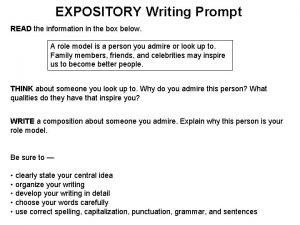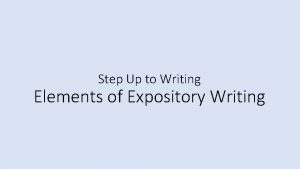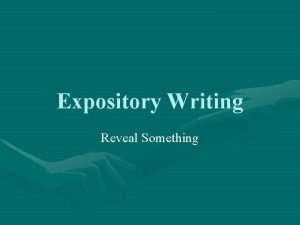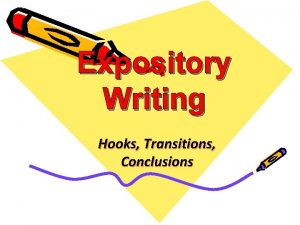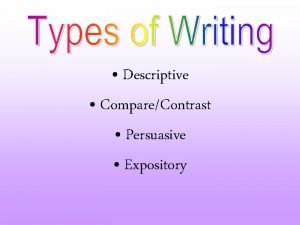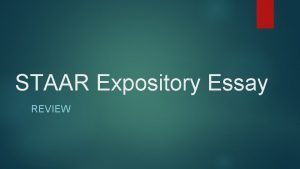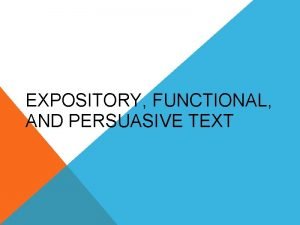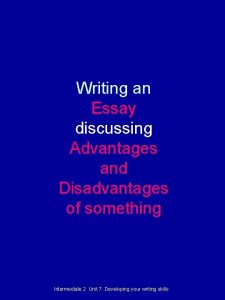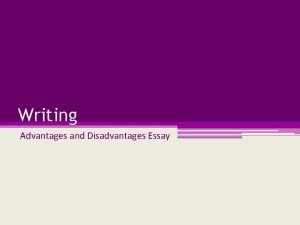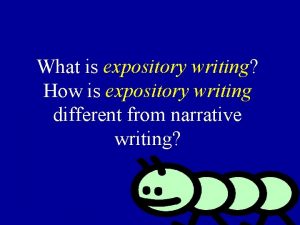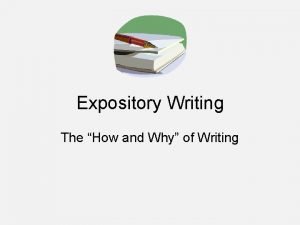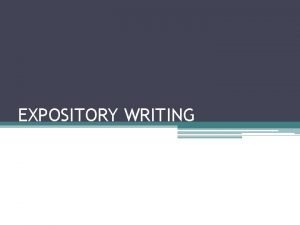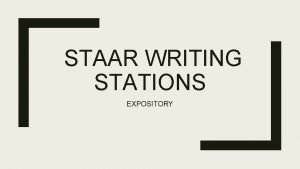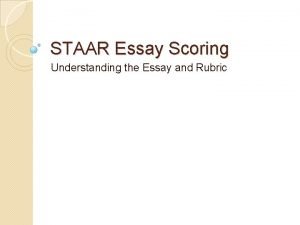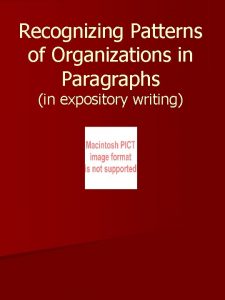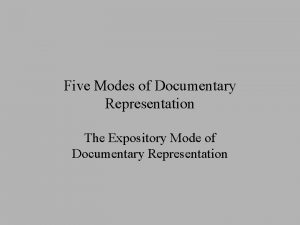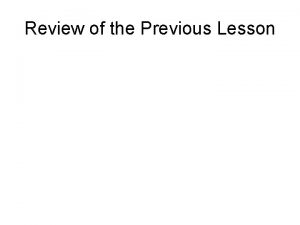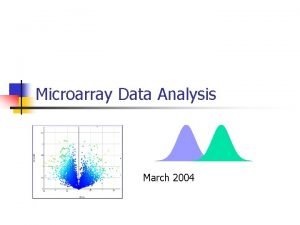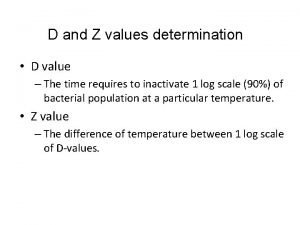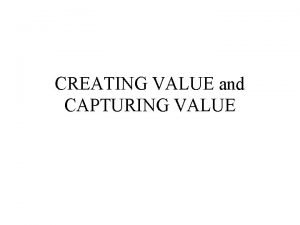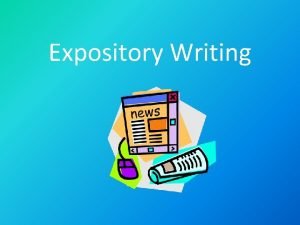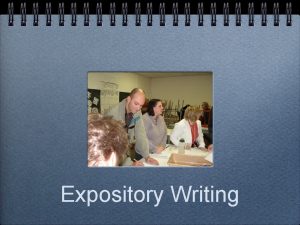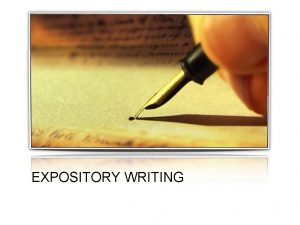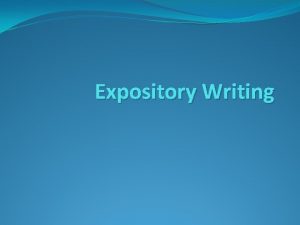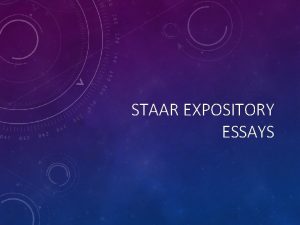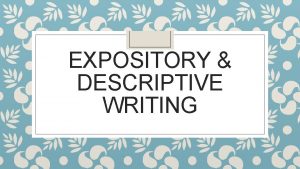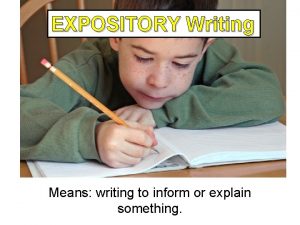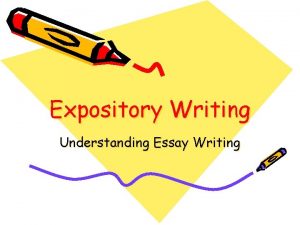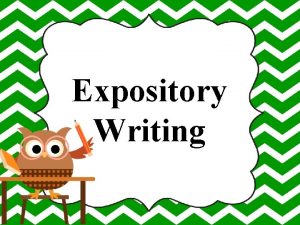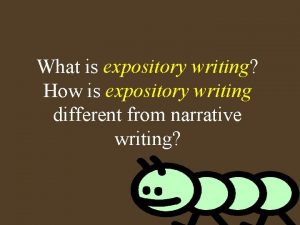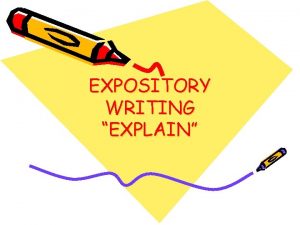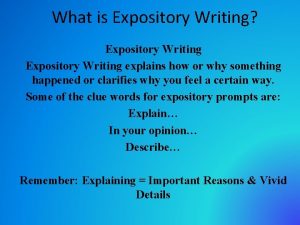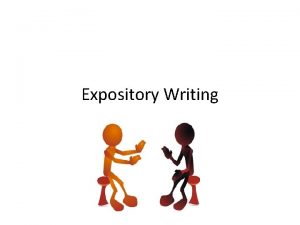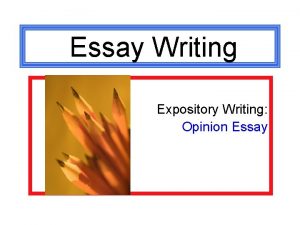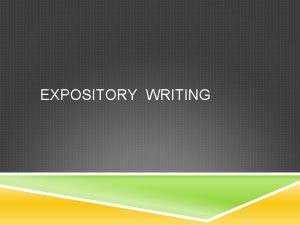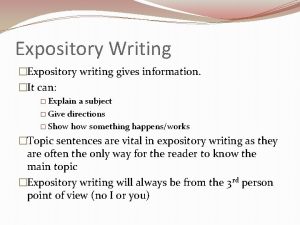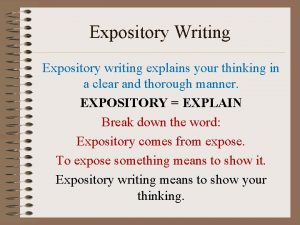The Value of Life Expository Reading and Writing
























































- Slides: 56

The Value of Life Expository Reading and Writing Unit

Getting Ready to Read : Quick Write – Before you read about what others say about the value of life, take a few minutes to respond in writing to the following quickwrite prompt: What does being alive mean to you? How do you assign value to life? What makes life challenging? What makes it worth living? Describe a few examples that help to show your thinking about how people should value life.

Introducing Key Concepts Because each of the texts in this module defines “life” in its own way, it will be helpful for you to examine the concept of “life” before reading the texts. To do this, you will create a concept map for “life” in your table group. Please fold your paper in half both ways to create four square boxes.

Concept: Life Sentence: It is difficult to place a precise value on human life. Synonyms: Vitality Living……what else? Existence Animate State of being fertile Consciousness Coherence Drawing breath Alive Energy Human being presence Contexts: Medical Legal/penal……what else? Moral Religious Societal Personal Professional Economic Autobiography biograpy Examples: Lifestyle Life’s work…. . what else? Life savings Eternal life Meaning of life Circle of life Life sentence Life story Non-Examples Death Inactivity……what else? After life Lifeless Passing Non=existence Nothingness Sterile

Concept Map: LIFE (add 4 more answers to each of the examples provided) Concept: Life Synonyms: vitality, living, energy, . . . what else can you think of? Examples: lifestyle, life’s work, life partner, . . . what else? Contexts: medical, legal/penal, religious, economic, . . . what else? Non-examples (antonyms): death, inactivity, inanimate objects, . . . what else?

Surveying the Text 1. What prior experience have you had reading these articles? 2. What did you notice about the page format and annotations? 3. What did you notice about the text structure?

Making Predictions And Asking Questions? 1. What is tragedy? What themes and outcomes would you expect to find in a tragedy? 2. What do you know about the language in plays written by Shakespeare? What have you done in the past to help yourself read Shakespeare effectively? 3. The soliloquy here begins with a famous quotation: “To be, or not to be-that is the question. ” What do you think is “the question” Hamlet is asking? How do you think he might answer it?

Adding to your vocabulary • • • 1. Soliloquy: a long speech made by a character who is alone on the stage in which he reveals his innermost thoughts and feelings. 2. Tragedy: a drama or other work that depicts the downfall or destruction of a character as a result of his/her tragic flaw 3. Tragic Hero: the main character of a tragedy who is usually of noble birth, or is high ranking and has many positive attributes. They usually meet a fateful end due to their tragic flaw but always come to self-realization and wisdom as a result. 4. Tragic Flaw : a personality flaw or an error in judgment that ultimately leads to a character’s death or destruction. 5. Iambic Pentameter: A metrical pattern in poetry which consists of 5 iambic feet per line (an iamb consists of one unstressed syllable followed by a stressed syllable)

Key Vocabulary Polar Opposite: An important rhetorical device Shakespeare uses in Hamlet’s soliloquy is antithesis. Hamlet explores a series of oppositional relationships. Brainstorm at least one oppositional word for the terms listed below. TERMS: 1. oppression 2. action 3. endurance 4. mystery 5. life

Key Vocabulary Word Families: List as many words as possible that are related to the following five concepts from Hamlet’s soliloquy. You may include synonyms directly from the text along with any other words you believe are related to the concept. Word families are not simply lists of synonyms; they may include any sets of words that frequently appear together. example: resolution: end (line 5), consummation (line 8), will (line 25), decision, outcome, and result 1. action: 2. thought: 3. suffering: 4. mortality: 5. fear:

First Reading Read the soliloquy from Hamlet. Although it is quite short, it packs much meaning into its 33 lines You may need to read it more than once before you feel you have good grasp on the ideas it contains. Background: At this point in the play, Hamlet feels that he is in a crisis. His father died a few months earlier under mysterious circumstances. Hamlet discovers that his father was secretly murdered-by Hamlet’s uncle, Claudius. Making things even worse, Claudius then marries Hamlet’s mother. Hamlet does not know what to do about this knowledge. He wonders whether he can trust anyone or if perhaps he is going crazy. As you read the text, focus on what you see the as the “big picture” Hamlet describes. Based on this first reading, would you say that Hamlet is an optimist or a pessimist? What are you reasons for thinking so?

Rereading The Text and Looking Closely at the Language: Because this series of texts focuses on the way people value life, you will now need to take a second look at the soliloquy. This time, read with a highlighter or colored ink or pencil, marking the places in the text where Hamlet describes what it means to be alive. Example: In lines two and three, Hamlet describes life as “the slings and arrows of outrageous fortune, ” so you could mark that phrase as an example of what Hamlet thinks it means “to be. ”

Rereading The Text and Looking Closely at the Language: Characterizing the text: Take a look at the parts of the soliloquy you have highlighted and compare them with a classmate’s markings. Find a few examples that you both have marked and mark the examples with a “+” or “-” to indicate whether the example how a positive (+) outlook on life or a negative (-) one. For the example about-”the slings and arrows of outrageous fortune”-you would mark a “-” because it compares being alive to being under attack. After you have marked several such examples, reflect on the question asked earlier: At this moment, does it seem as if Hamlet is an optimist or a pessimist?

Rereading The Text and Looking Closely at the Language: Paraphrasing the Text: Continuing to work with your partner, choose three of your samples and paraphrase them. “Paraphrasing” means putting the ideas of another writer into your own words. Again using the “slings and arrows of outrageous fortune” example, a paraphrase might sound something like this: “Hamlet compares being alive to having fate shoot arrows at him. ” As you paraphrase, pay attention to the style used by Shakespeare to convey his ideas. What is the difference between having Hamlet saying that life is like “the slings and arrows of outrageous fortune” and having him just say, “Life isn’t very pleasant”? What are the effects of Shakespeare’s stylistic choices as a writer?

Postreading We identified the genre earlier as a drama, but more specifically, this is a soliloquy. As noted earlier, a soliloquy is a dramatic convention that allows a character to speak aloud his or her thoughts. From your reading of the soliloquy, answer the following questions. 1. Does the soliloquy form seem to favor the expression of emotion (pathos) or logic (logos)? Explain why you think so. 2. Does Hamlet’s soliloquy use emotion (pathos) to create a specific effect on the reader? If so, describe how emotion is used. 3. Does Hamlet’s soliloquy use logic (logos) to create a specific effect on the reader? If so, describe how the logic is used.

Postreading 4. When Hamlet speaks his soliloquy, he is in crisis. How do his circumstances position Hamlet to speak with authority (ethos) about the value of life? Does Hamlet seem to be speaking about this life in particular or about the quality of life in general? 5. As careful readers, we are of course aware that it is not really Hamlet speaking, but a character created by Shakespeare. Does Shakespeare seem like someone whose opinions and attitudes are worth considering? Why?

Charting Multiple Text (CMT): Homework Take a look at the chart constructed for this assignment. It is a “graphic organizer” -a fancy name for something that helps you keep track of various pieces of information and the relationships among those pieces. The chart will prove useful in the writing assignment you will complete at the end of this module.

CMT directions As you look down the side of the chart, you will see that it asks you for information about the different texts you will be reading in this assignment: title, author, genre The title and author are self-explanatory: “genre” means “type, ” so you are asked to describe the type of writing. For this first text, you wold put “drama” or “play” as the genre. Across the top of the chart are the ideas you will be tracking as you read the texts in this module. They are presented in the form of questions:

CMT directions Q’s What is the text’s big issue? -this asks you to identify the “main idea” of the text. What claim does the text make? -This ask you to identify the writers perspective on the main idea. What are examples or quotes from the text? -This is where you would put examples given by the writer to help the reader understand his or her claim. The quotes and paraphrases you worked on earlier will fit well here. Be sure to include page or line numbers (or both) to identify where you found the quote or idea.

CMT directions Q’s What do you think about the text’s claim? -In this box, you will explain your response to the text’s claim, including to what extent (if any) you agree with it. What are your examples? -Give a few examples from your own experiences that help explain your response to the text’s claim. How does this text connect to other texts? -If you see a similarity to another text, make note of it here. Connections can be made even among texts that have very different claims. Take a few moments to fill in the chart of Hamlet’s soliloquy. The final box on making connections may be left blank for the moment.

It’s Not About the Bike Prereading Surveying the Text: The second text is an except form It’s Not About the Bike: My Journey Back to Life by Lance Armstrong with Sally Jenkins. The excerpt you will read is from the book’s opening chapter. Prior to reading, try to answer the questions below. They are designed to hep you activate your schema, which is a technical term that means you generate some prior knowledge so you will be ready to read and comprehend more actively.

Surveying the Text continued 1. What do you know about Lance Armstrong? 2. What is the significance of the fact that the book was written by Armstrong with Sally Jenkins? 3. What kind of text-what genre-do you think this book is?

MPAQ The following questions will help you make specific predictions about the content of Armstrong’s text: What topics do you think Armstrong might talk about that are related to the issues of how society values life? Do you think Armstrong’s claim about the value of life will agree with Hamlet’s or not?

Vocabulary Skim for and highlight unfamiliar words. Be prepared to identify paragraph # and sentence to share them with me. They will be your vocabulary words.

First Reading Read the text by Armstrong. As you read, pay attention to the way Armstrong talks about the value of human life. As you did with Hamlet, try to determine whether Armstrong appears to be generally pessimistic or optimistic in this passage. In addition, answer this question: Does Armstrong also present an argument about the value of death?

RTLCL Strategic Marking of the Text: Highlight, as you did with the Shakespeare text, you will mark Armstrong’s text. This time, use a different colored highlighter or color pencil (or other method) to mark the text differently than you did with the soliloquy. Mark the sentences, phrases, or words Armstrong uses to describe what he thinks it means to be alive.

Rereading the Text and Looking Closely at the Language • Third pass – Go through the text once more with a different color. Imagine you are reading the text from Hamlet’s perspective. Highlight any passages that Hamlet would find particularly interesting or compelling.

The Mock Interview • Armstrong and Hamlet provide quite a different perspectives on the meaning and value of life. Working with a partner, envision a scenario in which Hamlet and Armstrong have an opportunity to interview each others. • Choose which partner will be which author • Write 5 interview questions that author will ask the other. • • When you have written the questions, take on the persona of your author and conduct the interviews. Be sure to give answers that are in keeping with the points of view provided in the two texts. When finished, discuss the relative viewpoints of the characters.

Postreading Thinking Critically Armstrong’s text is an autobiography. As with the soliloquy we examined earlier, the form of this writing has an effect on how it is read and understood. The questions below will help you assess Armstrong’s text: An autobiography is a form of nonfiction - a text that tells the “truth. ” Do you think Armstrong is being truthful in his account of his life? Explain your reasoning. Armstrong’s autobiography is written “with” Sally Jenkins. What role do you think Jenkins played in the writing of the text? How does her participation in the creation of the text influence your interpretation of Armstrong’s story? In other words, how does the combination of Armstrong and Jenkins as authors affect the “ethos” of the text?

Postreading Thinking Critically Do you think Armstrong’s story has an impact on the reader because of its use of logic (logos) or emotion (pathos) or both? Unlike Hamlet, Armstrong is not in the midst of his crisis when he writes his story; instead, he writes about his experiences in hindsight. Does that have an impact on Armstrong’s ability to make his ideas and story compelling to the reader? Explain your reasoning.

CMT: Homework For homework: make an entry in your chart for the Armstrong text. Fill it out as you did with the soliloquy. When you reach the entry for “How does this text connect to other texts? ”, briefly describe the ways in which Armstrong responds to or challenges the assertions Shakespeare makes in his soliloquy for Hamlet.

“What Is a Life Worth? ” by Amanda Ripley Surveying the Text: The article “What Is a Life Worth? ” comes from the February 11, 2002, issue of Time magazine. Take a look at its form and length. How much time do you think it will take to read this piece? Have you read anything from Time magazine? What do you know about that publication? What kinds of articles are commonly included in it? What types of people do you think compose the magazine’s primary readership?

MPAQ What predictions can you make about the article’s content from this subtitle? What connections do you think you might see between this article and the previous two texts you have read? The first two texts took first-person perspectives on the subject. Do you anticipate that this article will continue in that vein, or will it be different? Why do you think so?

Vocabulary Skim for and highlight unfamiliar words. Be prepared to identify paragraph # and sentence to share them with me. They will be your vocabulary words.

First Reading As you read “What Is a Life Worth? ” for the first time, look for the main issues and the various stances people take in response to those issues. Be sure to also look for connections to the idea of valuing life and to what was previously said about valuing life by Shakespeare and Armstrong. How is “life” defined in this text? For example, does “life” refer to a human body, a soul, a human experience, existence, or quality of life? Does this definition include a person’s personal life and professional or working life?

Rereading Strategic Marking of the Text: Choose two colors or different ways to the mark the text and revisit the text of the article on the 9/11. The two method of marking the text will be used to mark two different aspects of the article. With the first method, highlight the words, phrases, and sentences form the article that describe valuing life in legal and financial terms. With the second color, high light the words, phrases, and sentences that describe valuing life in human and emotional terms.

Post Reading Most news articles such as “What Is a Life Worth? ” try to take an objective, unbiased approach. Would you agree that this text is unbiased, or do you think it favors one perspective? Explain your answer. What kinds of evidence does Ripley, The author of the article, use to get across the key ideas and issues associated with the compensations of 9/11 victims and their families? Are any specific types of evidence more compelling to you as a reader? Less compelling?

Post Reading How accurate do you think the information in the article is? In other words, do you think Time magazine and Ripley are to be trusted? Why or why not? Does the article use logic, emotion, or both to make an impact on the reader? If so, describe how. Compare that use to the way logic and emotion are used by Shakespeare, Armstrong, or both.

CMT: Homework Make a third entry on your chart for “What Is a Life Worth? ” Feel free to use the highlighting, summarizing, connections, and critical thinking work your did previously as a way to fill out the chart.

First Reading Read through the text below, noting the way that life’s value is determined by the Human life Value of Calculator. Pay particular attention to the data input, which reflects a twenty-year-old single mother working in a service industry. If you have access to the Web site itself, you can choose a variety of data inputs to see how the results vary. Try providing different age, gender, occupation, and income information, and then examine the effect on the results. As you make sense of the calculator and its workings, make note of any connections you see to the previous texts we have read.

Value of Life Calculator Responding to the Text: Write a brief response-no more than eight sentences-to the Human Life Value Calculator Web site. The response should describe what the Web site asserts about a human life’s value and your reactions to those assertions. Remember that your response does not have to be in complete agreement or disagreement with the text; you might agree with some aspects or disagree with others.

CMT: Homework As you did with the previous texts, fill out a chart entry for the Web site. To facilitate this task, you may refer, as needed, to the highlighting you have done, your responses, and the questions (above) you just answered.

Writing: The Value of Human Life

Thesis Statements – Occasion/Position Statements – is a complex, two-part sentence that begins with one of the following words: If After In order that Whether Although In order to While As Since As if So that As long as Though As soon as Unless Because Until Before When Even Whenever Even if Where Even though Wherever

Occasion/Position The Occasion -is the first part of the sentence The Position -Is the second part of the sentence -Introduces your reason for writing -states what you plan to prove or explain in your paragraph -Can be any event, problem, idea, solution or circumstance that gives you a reason to write -it is the independent clause in the complex sentence -Is the dependent clause in the complex sentence Example: 1. Although my family and I have taken many wonderful vacations, none was more fun and exciting than our camping trip to the Grand Canyon

EXAMPLES: 2. Before you make the decision to light up a cigarette, consider the problems caused by smoking. Smoking can give you bad breath, wrinkles, and lung cancer. 3. Even though bike helmets are sometimes unfashionable and uncomfortable, all cyclists should wear them. Helmets protect a rider’s head and face, prevents death, and life altering brain injuries. 4. If students use chemicals to do science experiments, it is important that they learn the proper way to dispose of them. 5. Although many people believe that we can assign monetary value to a human life, I disagree. Love, relationships, and experience cannot be discounted nor measured by dollars and cents.

Using the Words of Others When you write anything in response to a text you have read, you will have to describe for your reader what the original text says. This can be done through direct quotations (saying precisely what the original author said), paraphrasing (providing a specific idea from the text, but putting it in your own words), and summarizing (providing the primary ideas from the text in a generalized form). The activities you have already completed have asked you to find quotations provide paraphrases, and writes summaries, so you should be well prepared for using the words of Shakespeare, Armstrong, Ripley, and the movie within your formal essay.

Using the Words of Others When you use any method for representing the ideas from another text in your own writing, you must provide a citation. Example: Not everyone who lost a loved one in 9/11 was compensated because “the rules give preference to the victim’s spouse and children” (Ripley 42). Remember, even when you are summarizing and paraphrasing, you still must attribute the ideas to the original writer.

Writing Assignment You have your choice of two essay topics: 1. Read “Hamlet’s soliloquy” by Shakespeare, “it’s Not About the Bike” by Lance Armstrong and Sally Jenkins, Amanda Ripley’s “What Is a Life Worth? ” and play with “The Value of Life Calculator. ” All four sources define the value of life differently. Draw on all the sources to create a definition for the value of life. Then write an essay that analyzes how the appeals (ethos, logos, pathos) helped to create your definition. Support your definition with specific references to the text. 2. Read “Hamlet’s soliloquy” by Shakespeare, “it’s Not About the Bike” by Lance Armstrong and Sally Jenkins, Amanda Ripley’s “What Is a Life Worth? ” and play with “The Value of Life Calculator. ” All four sources define the value of life differently. Based on your readings, how should our society assign value to human life? Be sure to refer to and cite the readings. You may also use examples from other sources and from your own personal experiences and observations.

Writing Assignment Requirements • • • 1. A clean, rough draft is due in class on Tuesday, April 9, 2013 for a very valuable peer edit and review. You will receive a test grade for having your essay in class on the day it is due and participating in the review process. 2. Do not put your name on the paper- instead of your name, type in the number I assign to you today during class. 3. Your paper must be typed and in MLA format with a works cited page 4. When you turn in your final, revised essay you must include the CMT, and the highlighted, annotated texts, the rough draft with peer edits, and an outline or some other pre-writing organizer. All of these materials together, will be worth a test grade. 5. Turn in a final, clean, revised essay by April 17, 2013. You may email it to mrstraister@gmail. com if you wish but you must turn in the rest of the required components in class. 6. Late papers will not be accepted.

A word about plagiarism • • Plagiarism will not be tolerated under any circumstances and will result in a zero on your paper. Plagiarism includes any type of copying and pasting from the internet, and summary or paraphrasing, or direct quotations that are not properly cited. People must be given credit for their work and ideas

Essay Edit 1 Trade essays (please always sign your name and which edit you are conducting). Reverse outline. Take the essay and outline it’s key points.

Essay Edit 2 Trade essays (please always sign your name and which edit you are conducting). Box it out and label. Box out and label the intro, body, and conclusion.

Essay Edit 3 Trade essays (please always sign your name and which edit you are conducting). Circle and underline. Circle all sentences that are short/fragmented. Circle any transitions you find. Underline sentences that are run-on or seem too long.

Edit Review the reverse outline. How does it compare your outline? Does it make the argument you intended? Review the box it out. Is your thesis in the right place. Do your body paragraphs stay on topic? Did you write a conclusion? Review circle underline. Do you have a healthy balance of simple and complex sentence structure? If not change it. If you used transitions rewrite the sentence dropping the transition.

MLA Format Times New Roman 12 font Double spaced (before you start typing: go to format, paragraph, click double space-never hit return twice it’s now done for you). Last Name page number in header. Upper left hand corner type: First and Last Name Teacher Name Class and Period 7 January 2010 Title Click tab to start your paragraph and begin your introduction. From here on out you should know how to complete your essay.
 While reading activities
While reading activities Value creation value delivery value capture
Value creation value delivery value capture Structure of exposition writing
Structure of exposition writing Problem and solution expository essay
Problem and solution expository essay Argumentative essay vs expository essay
Argumentative essay vs expository essay How to write 50 centavos
How to write 50 centavos Aims and objectives of teaching
Aims and objectives of teaching Types of reading skills in communication
Types of reading skills in communication Real definition of extensive reading
Real definition of extensive reading Intensive reading and extensive reading
Intensive reading and extensive reading Developing effective reading skills
Developing effective reading skills Expository paragraph topics
Expository paragraph topics Speech conclusion examples
Speech conclusion examples Sequence expository text examples
Sequence expository text examples Kilala din ito sa tawag na analitikal na pagsulat
Kilala din ito sa tawag na analitikal na pagsulat Rhetorical question hook
Rhetorical question hook Definition
Definition Staar released writing
Staar released writing Expository writing prompt
Expository writing prompt Explain expository writing
Explain expository writing Expository essay introduction examples
Expository essay introduction examples Parts of essay
Parts of essay Elements of expository writing
Elements of expository writing Whats a controlling idea
Whats a controlling idea Expository writing hooks
Expository writing hooks Expository vs narrative
Expository vs narrative Is persuasive writing expository
Is persuasive writing expository Staar example essays
Staar example essays What is an expository text
What is an expository text Essay hamburger
Essay hamburger Discusses advantages and disadvantages
Discusses advantages and disadvantages Advantage of essay
Advantage of essay Expository writing hooks
Expository writing hooks Narrative vs expository writing
Narrative vs expository writing Expository essay staar examples
Expository essay staar examples Writing reasons
Writing reasons Rules of expository writing
Rules of expository writing Golden bricks writing
Golden bricks writing Staar
Staar Expository patterns
Expository patterns Expository documentary
Expository documentary Value received and value parted with
Value received and value parted with P-value formula
P-value formula D value and z value
D value and z value Acetyl value principle
Acetyl value principle Capturing value from customers
Capturing value from customers Hình ảnh bộ gõ cơ thể búng tay
Hình ảnh bộ gõ cơ thể búng tay Slidetodoc
Slidetodoc Bổ thể
Bổ thể Tỉ lệ cơ thể trẻ em
Tỉ lệ cơ thể trẻ em Chó sói
Chó sói Tư thế worm breton là gì
Tư thế worm breton là gì Chúa yêu trần thế alleluia
Chúa yêu trần thế alleluia Môn thể thao bắt đầu bằng chữ đua
Môn thể thao bắt đầu bằng chữ đua Thế nào là hệ số cao nhất
Thế nào là hệ số cao nhất Các châu lục và đại dương trên thế giới
Các châu lục và đại dương trên thế giới Cong thức tính động năng
Cong thức tính động năng
